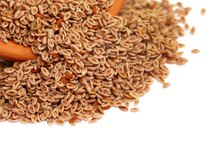Cereals Containing Psyllium
Psyllium is a plant grown in India that contains fiber similar to oat bran. The U.S. Food and Drug Administration released information on the potential of psyllium reducing heart disease and allowed cereal manufacturers to advertise its heart benefit. In addition, psyllium can help to relieve constipation, and diarrhea and is used to help treat the symptoms associated with irritable bowel syndrome, hemorrhoids and intestinal disorders, according to the University of Maryland Medical Center 1. Currently, several cereals on the market contain psyllium.
All-Bran Buds
All-Bran Buds is a product of Kellogg’s. The cereal was introduced in the 1960s, and gained popularity in the late 1980s when psyllium started showing heart-health benefits. All-Bran Buds is available in your local grocery stores in the United States and Canada. The advertisement on the front box of the cereal expresses that you will get as much as 51 percent of daily fiber in one serving, which is one-third cup of cereal.
- All-Bran Buds is a product of Kellogg’s.
- The advertisement on the front box of the cereal expresses that you will get as much as 51 percent of daily fiber in one serving, which is one-third cup of cereal.
Smart Bran
Foods High in Psyllium
Learn More
Smart Bran contains psyllium, oat bran and wheat bran. Nature’s Path introduced the cereal to the market and states that you can consume 13 grams of organic fiber per serving 3. If you’re searching for an organic, heart-healthy cereal, Nature’s Path advertises that Smart Bran is USDA Organic 3.
Heartwise / Fiberwise
Kellogg’s introduced Heartwise to the public in 1989, but changed the name to Fiberwise due to objections by the FDA that the word "heart" in a brand name implied unsubstantiated health benefits. This brand of cereal was Kellogg’s second attempt in introducing a cereal containing psyllium to the market, but due to the negative publicity, the cereal was discontinued and taken off the shelves in 1993.
Benefit
What Is the Difference Between Miralax & Metamucil?
Learn More
Benefit hit the market in 1989 and was General Mills' version of a heart-healthy cereal containing psyllium. During the year of release, the FDA challenged the advertisement claims on Benefit’s box front. The cereal manufacturer removed Benefit from the shelves in December 1989 after the FDA inquired about the claims.
Related Articles
References
- University of Maryland Medical Center: Psyllium
- Kellogg’s: A Historical Overview
- Nature’s Path: Smart Bran
- The New York Times: Company News; Kellogg Cereal Has New Name
- Xiao Z, Chen H, Zhang Y, et al. The effect of psyllium consumption on weight, body mass index, lipid profile, and glucose metabolism in diabetic patients: A systematic review and dose-response meta-analysis of randomized controlled trials. Phytother Res. 2020. doi:10.1002/ptr.6609
- Anderson JW, Allgood LD, Lawrence A, et al. Cholesterol-lowering effects of psyllium intake adjunctive to diet therapy in men and women with hypercholesterolemia: a meta-analysis of 8 controlled trials. Am J Clin Nutr 2000;71:472-479.
- deBock M, Derraik JGB, Brennan CM et al. Psyllium supplementation in adolescents improves fat distribution and lipid profile: a randomized, participant-blinding, placebo-controlled, crossover trial. PLoS One 2012;7:e41735.
- Ribas SA, Cunha DB, Sichieri R et al. Effects of psyllium on LDL cholesterol concentrations in Brazilian children and adolescents: a randomized, parallel clinical trial. Br J Nutr 2015;113:134-141.
- Van Rosendaal GMA, Shaffer EA, Edwards EL, et al. Effect of time of administration on cholesterol-lowering by psyllium: a randomized cross-over study in normocholesterolemic or slightly hypercholesterolemic subjects. Nutr J 2004;3:1-7.
- Wei W, Wang H, Chen XY et al. Time and dose-dependent effect of psyllium on serum lipids in mild to moderate hypercholesterolemia: a meta-analysis of controlled clinical trials. Eur J Clin Nutr 2009;63:821-827.
Resources
Writer Bio
Based in Massachusetts, Carolyn Russell-DeLucas has been writing since 2007. She specializes in topics related to health, beauty and nutrition. Russell-DeLucas graduated from Brevard Community College with an Associate of Arts.









